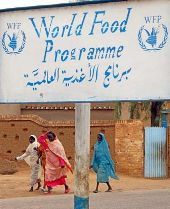North Darfur Governor calls for return of aid groups, reaches out to rebels
KHARTOUM, Sudan, Nov 27, 2004 (AP) — The governor of the troubled North Darfur state said Saturday his government has lifted local restrictions on humanitarian aid groups in a sign of goodwill, but an aid official said the move alone is not enough to allow his group to resume work.

|
|
Headquarters of WFP in al-Fasher, North Darfur, Sudan. (AP). |
Barry Came, a World Food Program officer in Khartoum, said that as of Saturday night the U.N. security restrictions on the state still apply. He said the easing of state government restrictions – although a welcome attempt to “lessen tension”- is not enough to allow resumption of assistance.
“As of a few hours ago, there was no change in our operations,” said Came.
Fighting between the government and rebels erupted last week and caused aid groups to suspend operations. The World Food Program said Thursday that it was temporarily suspending its operations in most of the troubled state, cutting off some 300,000 internally displaced people from WFP food.
The governor, Osman Youssef Kebir, told The Associated Press that local government restrictions on aid groups’ movements on roads had been lifted. In an appeal to rebels and humanitarian groups, he said is hosting a conference on Sunday in El Fasher, the state capital, to make the new policy official. He has invited representatives of the rebel groups, the African Union and the European Union, which currently has a delegation visiting El Fasher.
“We have gone beyond the escalation phase, and we as a government are responsible to protect citizens and push the peace process forward,” said Kebir, whose government accuses rebels of killing at least 30 people in the latest round of fighting. “So we see that we should call on the rebels to reject confrontations and escalation.”
Kebir said with this move the government is reaffirming its commitment to all international agreements.
“We open all the roads and doors to humanitarian groups and remove all restrictions on their movement and we call upon them to resume their operations,” he said in a telephone interview from El Fasher.
Despite a Nov. 9 cease-fire, fighting broke out last week between government-backed militias, known as Janjaweed, and Sudan Liberation Army rebels. On Monday, 45 humanitarian aid workers who fled the fighting were rescued by the African Union mission.
The United Nations and Britain had blamed the rebels for breaching cease-fire agreements. The main rebel group, the Sudan Liberation Army, has rejected responsibility for the renewed fighting in north Darfur, saying that it was responding to attacks by the state air force and pro-government militia.
More than 1.8 million people are estimated to have been driven from their homes in the 21-month Darfur conflict. International agencies estimate that disease, malnutrition and clashes among the displaced have killed more than 70,000 people since March. Many more have been killed in the fighting, but no firm estimate of the direct war toll exists.
